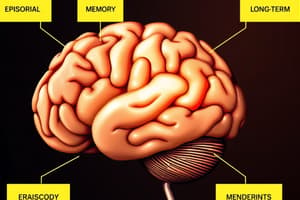Podcast
Questions and Answers
What are the three types of long-term memory (LTM)?
What are the three types of long-term memory (LTM)?
Procedural, semantic, and episodic.
Define procedural memories.
Define procedural memories.
Procedural memories are the memory of how to do things, like riding a bicycle, that require repetition and are implicit.
What are semantic memories?
What are semantic memories?
Semantic memories are facts and knowledge about the world that are not personal, similar to an encyclopedia.
What characterizes episodic memories?
What characterizes episodic memories?
How does the case of K.F. support the distinction between episodic and semantic memories?
How does the case of K.F. support the distinction between episodic and semantic memories?
What evidence supports the distinction between procedural and declarative memories?
What evidence supports the distinction between procedural and declarative memories?
What role does neuroimaging play in understanding types of LTM?
What role does neuroimaging play in understanding types of LTM?
What are the practical applications of understanding different types of LTM?
What are the practical applications of understanding different types of LTM?
What evidence do neuroimaging studies provide regarding the different types of long-term memory (LTM)?
What evidence do neuroimaging studies provide regarding the different types of long-term memory (LTM)?
How can the understanding of LTM types lead to real-life applications in psychological treatment?
How can the understanding of LTM types lead to real-life applications in psychological treatment?
What is a major debate surrounding the classification of LTM types, particularly between episodic and semantic memory?
What is a major debate surrounding the classification of LTM types, particularly between episodic and semantic memory?
In what way does the research by Belleville (2006) contribute to our understanding of LTM?
In what way does the research by Belleville (2006) contribute to our understanding of LTM?
What is the significance of Tulving's PET scan study in the context of procedural and declarative memory?
What is the significance of Tulving's PET scan study in the context of procedural and declarative memory?
Flashcards
Neuroimaging evidence for separate LTM types
Neuroimaging evidence for separate LTM types
Neuroimaging studies, like PET scans, show that episodic and semantic memories are recalled from different areas of the prefrontal cortex, supporting the idea of separate LTM types.
Real-world applications of LTM distinction
Real-world applications of LTM distinction
Researchers can use the understanding of distinct memory types to create targeted treatments for memory problems.
Procedural memory: A separate LTM system
Procedural memory: A separate LTM system
Studies suggest procedural memory is distinct from episodic and semantic memories, highlighting the existence of multiple LTM systems.
Debate about episodic and semantic memory distinction
Debate about episodic and semantic memory distinction
Signup and view all the flashcards
Importance of distinguishing between LTM types
Importance of distinguishing between LTM types
Signup and view all the flashcards
Procedural Memory
Procedural Memory
Signup and view all the flashcards
Semantic Memory
Semantic Memory
Signup and view all the flashcards
Episodic Memory
Episodic Memory
Signup and view all the flashcards
Distinguishing between LTM Types
Distinguishing between LTM Types
Signup and view all the flashcards
K.F. Case Study
K.F. Case Study
Signup and view all the flashcards
H.M. and Clive Wearing
H.M. and Clive Wearing
Signup and view all the flashcards
Neuroimaging Evidence
Neuroimaging Evidence
Signup and view all the flashcards
Real-Life Applications of LTM
Real-Life Applications of LTM
Signup and view all the flashcards
Study Notes
Types of Long-Term Memory (LTM)
- Procedural Memory: Memory for how to do things (e.g., riding a bike, driving). Requires repetition and practice. Implicit; difficult to explain even when actions are easy. Automatic.
- Semantic Memory: Memory for facts and general knowledge (e.g., capital of England, your name). Explicit; shared knowledge. Often starts as episodic but loses the event link.
- Episodic Memory: Personal memories of events (e.g., last birthday, breakfast, first day of school). Explicit; personal experiences. Includes details, context, and emotions.
Positive Arguments for Multiple LTM Types (AO3)
- Distinguishing Episodic and Semantic Memories:
- Rosenbaum et al. (2005): Patient K.F. had extensive brain damage affecting episodic memory but leaving semantic memory intact. This supports the idea of separate neural systems for these types of memory.
- Distinguishing Procedural and Declarative Memories (e.g., episodic and semantic):
- HM and Clive Wearing: Both had brain damage affecting episodic memory but their semantic and procedural memories remained relatively intact. This proves procedural memories are different. HM could learn procedural skills but didn't remember learning them.
- Neuroimaging Evidence:
- Tulving et al. using PET scans found different brain regions (left prefrontal for semantic, right prefrontal for episodic) activated during recall. Replicated studies further support this distinction.
- Real-Life Applications:
- Belleville (2006): Studies improved episodic memory in older adults with cognitive impairment. Understanding memory types helps to develop specific treatments.
Negative Arguments for Multiple LTM Types (AO3)
- Debate about Episodic and Semantic Distinction: Some research questions the clear distinction between episodic and semantic memory, suggesting they may be intertwined rather than completely separate.
Studying That Suits You
Use AI to generate personalized quizzes and flashcards to suit your learning preferences.




